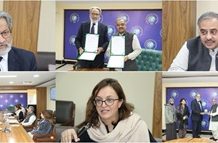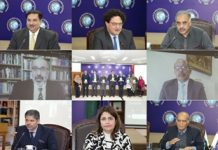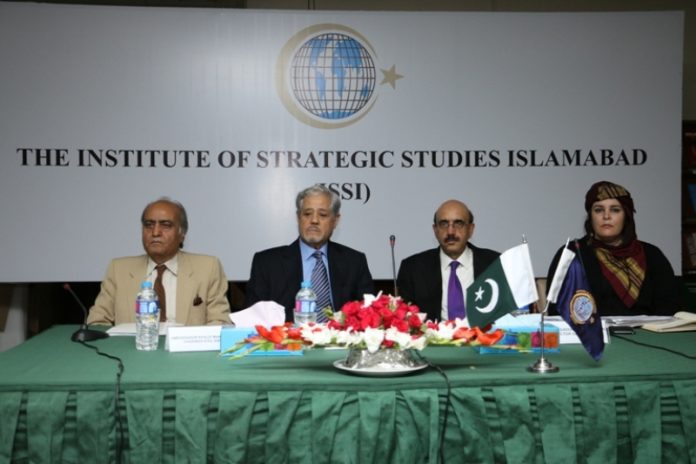Press Release
Seminar and Roundtable
on
“Human Rights, Youth and the Issue of Jammu and Kashmir”
May 11, 2016
The Institute of Strategic Studies, Islamabad (ISSI), organised a seminar on “Human Rights, Youth and the Issue of Jammu and Kashmir” on May 11, 2016. President Azad Jammu and Kashmir, Sardar Mohammad Yaqood made the Inaugural Address, while Lt. Gen. Abdul Qadir Baloch, Federal Minister for State and Frontier Regions was the Chief Guest at the occaion. The seminar was also addressed by a number of distinguished speakers including Maulana Fazal-ur-Rahman, Chairman, Special Committee of the Parliament on Kashmir; Senator Raja Zafarul Haq; Senator Lt. Gen. (Retd.) Abdul Qayyum; Mr. Ghulam Muhammad Safi, Convenor All Parties Hurriyat Conference (APHC); Dr. Seemia Raheel Qazi, Head of Foreign Affairs, Women’s Wing, Jamaat-i-Islami, and Member, Council of Islamic Ideology; and Dr. Attiya Inatyatullah, former Federal Minister.
In his welcome remarks, Director General ISSI, Ambassador Masood Khan said that while Kashmiris have been subject to atrocities since 1948, but ever since the increased human rights violations during the 1990s, every man, women and child is suffering, and the youth Indian Occupied Kashmir, he said, has especially been victimised by the security forces. He said that the movement started by the youth against the Indian aggression since Afzal Guru’s anniversary at Delhi University in early 2016, has generated a new enthusiasm for the right of self-determination in IOK. This new enthusiasm is being carried out politically, through social media and on ground resistance against the Indian occupation of Kashmir. Pakistan needs to realise its responsibilities, and recommended that while the talks between India and Pakistan are essential, but we also need to proactively raise our voice at the international forums; lobby within Kashmir and Indian civil society; work proactively with the Human Rights Council; and, provide relief to the affected Kashmiris. Intra-Kashmir confidence-building measures should also be institutionalised, especially Intra-Kashmir trade and travel. He said that peace and security is essential for the stability of the South Asian region.
Sardar Mohammad Yaqoob Khan, President Azad Jammu and Kashmir, in his inaugural address said that Kashmir movement cannot ever be compromised. Kashmir is no more a one-point agenda between India and Pakistan. People of Kashmir want to keep the movement peaceful, and it should not be associated with terrorism. Kashmiris are small in number but their demand is on principles and has immense strength. He said that the political parties of Pakistan must realise that they cannot ignore the Kashmir dispute and should try and educate the people about it in their public meetings as well.
Abdul Qadir Baloch suggested that a balance has to be created in the country between the opinions of those who want to have friendly relations with India, and those who want to keep Kashmir as their first priority. It is unfortunate that it is made out as an issue between India and Pakistan and is not considered as a human issue. Every home in occupied Kashmir and every individual have been affected. The issue, he said, needs to be resolved in phases.
Maulana Fazal-ur-Rehaman, regretted that the issue has been addressed with emotions so that it could be popularly accepted. The political application of the argument has lost its efficacy in world opinion since it is invariably associated with Pakistan’s security and economic interests. This dilemma must be understood and the issue must be talked about exclusively for Kashmiris. He recommended that the only way is negotiations. Pakistan should try and strategise the negotiations rather than thinking in terms of winning.
Senator Raja Zafarul Haq emphasised on the need to take the issue of Jammu and Kashmir in view of the UN Charter and the resolutions passed unanimously on this issue. He rejected the opinion that the international circumstances are not in favour of Pakistan’s stance on Kashmir. He gave the example of OIC which has passed a most comprehensive resolution on Kashmir recently. He said that Pakistan needs to highlight the dispute through its diplomatic missions more proactively.
Senator Lt. Gen Abdul Qayyum emphasised that since human rights are universal, awareness must be spread through seminars and media including social media. The OIC resolution must be taken forward. Since Kashmir is important for the defence of Pakistan, this is being exploited as Pakistan’s vulnerability.
Ghulam Muhammad Safi suggested that India must recognise Kashmir as ‘a dispute’ and as a ‘precondition’ to any dialogue between India and Pakistan. He suggested that India could go to any extent; therefore, Pakistan should remain prepared.
Dr. Samia Raheel Qazi, gave an account of human rights violations in Kashmir. She regretted that the new connotations like ‘half widows’ and ‘half wives’ have surfaced in Indian Occupied Kashmir. The resistance movement started by the youth is encouraging and there is a strong awareness in Kashmiris for their rights.
Dr. Attiya Inayatullah, also appreciated the youth movement started since 1989, and said that it has taken a strategic shift since 2008. The Kashmiri youth is educated, organised and integrated and are redefining the course of then Kashmir struggle. She rejected the patch work solution of the Kashmir dispute. Human rights situation is volatile and humanitarian rights emergency must be declared. The Kashmir issue must have a rights-based framework as against a result-based framework. It is the responsibility of the UN to alleviate the Kashmir dispute. International Criminal Court should also take note of the mass graves in Indian Occupied Kashmir (IOK). Dr. Attiya recommended establishing a humanitarian corridor between the IOK and Azad Jammu and Kashmir.
In an interactive roundtable discussion that followed the presentations, it was suggested that in light of emerging paradigm in Indian Occupied Kashmir, the struggle and strength of the Kashmiri youth must be assisted. Since the potency of the UN resolutions is in question, we need to develop a collective international narrative through media, seminars and soft power techniques. Allies in the civil society of India must also be explored. Efforts must also be made to promote the young leadership in the movement, and women should also be encouraged to participate.
Chairman Board of Governors, ISSI Ambassador Khalid Mahmood in his concluding remarks said that the right of self-determination must not be coupled with terrorism. Pakistan should not withdraw from its principle stance of the right of Kashmiris for self-determination. The legality and the righteousness of the struggle of Kashmiris are well recognised. If Pakistan wants to bring it up in International Criminal Court, the Kashmir issue must be studied in detail. Similarly, Human Rights Council must be made aware of the violations by highlighting the findings of Indian Human Rights Council itself.
Shamsa/Tooba/Taimur/11052016












